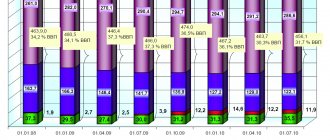What is deferment
Both parties to any loan agreement - both the bank and the borrower - are interested in the proper fulfillment of their obligations. The deterioration of the financial situation will directly affect the lender, since delays will automatically change the payment schedule. If the delay in payment of the debt occurs in isolated cases, then most likely the bank will not take serious measures against the borrower. But if such violations occur constantly, then the credit institution has every right to terminate the concluded agreement and foreclose on the mortgaged property.
The most common reasons for the deterioration of the borrower's solvency are:
- job loss;
- wage reduction;
- serious illness, accident or other factors contributing to disability;
- pregnancy, birth of children and subsequent care for them;
- planned change of job (in the absence of savings, this can also become a problem for the borrower);
- family circumstances (eg divorce);
- fluctuations in exchange rates for loans issued in foreign currency.
Depending on the amount of the client’s debt to the bank and the nature of the circumstances, the following options for solving the problem are possible:
- Extension (increase) of the debt repayment period (this will significantly reduce the amount of monthly payments in proportion to the payments feasible for the borrower).
- Writing off part of the debt (which is unlikely).
- Credit holidays (exemption from payments or part thereof, as well as redistribution of deferred interest payments to another period)
- Refinancing or refinancing (issuing a new loan to repay an existing one).
- Cancellation of penalties and accrued fines (as a last resort in rare cases).
If the client can convince the bank that the difficulties that have arisen are temporary and the situation will soon improve, then the lender can meet him halfway and provide a deferment on the loan payment.
In most banks, mortgage payment deferrals can be of two types:
- preferential payment (exemption from payment of the principal debt for a certain period with mandatory repayment of interest monthly or a reduction in the annuity payment several times for a specified period with subsequent adjustment of the schedule upward in the future);
- holidays or grace period (deferment of payment for several months, maximum one year).
A deferment can only be obtained if substantial evidence is provided. Such evidence includes confirmation of the situation using documents. Among them:
- child's birth certificate;
- medical certificate or extract from the patient’s card;
- a copy of the work book;
- certificate of divorce;
- income certificate;
- an official letter from the borrower's future employer about the intention to hire him within a specified period.
Any case is unique, so the borrower’s main task is to present the facts in as much detail as possible, with evidence attached, and insist on a speedy improvement of the situation.
There is also a mortgage with deferred payment in Sberbank, Uralsib, DeltaCredit and a number of other banks. It applies only to housing under construction from the developer and implies a deferment of mortgage payments during the construction period. For more information about these programs, read the posts “mortgage holidays” and “mortgage in installments from Sberbank.”
Who is entitled to

Only certain categories of borrowers will be able to count on receiving a mortgage deferment. These include:
- Borrowers who entered into a loan agreement at least six months ago.
- Clients who previously have a positive credit history and a reputation as a conscientious partner.
- Citizens who, due to objective reasons, find themselves in a difficult life situation that has significantly affected their creditworthiness.
- Persons who have not previously made systematic delays on this loan.
The terms of the loan agreement may provide for the suspension of payment of the principal debt without penalties in relation to participants in special mortgage lending programs (for example, under the “Young Family” program).
Every borrower must understand that providing a deferment or installment plan is not the obligation of the lender, but only his right. Therefore, the bank can legally refuse to accommodate the client halfway.
Let's consider the features of providing deferment in some banks, depending on the specific case in the life of the borrower.
- Obtaining a deferment at the birth of a child and during maternity leave.
Such a deferment is usually offered only by large banks. For example, Sberbank of Russia and VTB24 Bank can reduce the monthly payment to the amount of mandatory interest. Such an indulgence will help a family with a newborn reduce their credit burden for some time. The maximum time for receiving such a benefit is three years. But you can count on it in quite rare cases. Usually the bank makes concessions for a period of 1 - 1.5 years, when the mother can go back to work. For 3 years, the bank can only give a deferment to a single mother for whom an agreement has been drawn up.
- Granting a deferment due to force majeure.
This refers to difficulties due to loss of work, loss of a breadwinner, loss of ability to work, etc. If the occurring factors are recognized as an insured event, the bank will recommend that the client contact the insurance company to receive the insurance amount and repay the debt to the creditor at its expense. If an insurance contract has not been concluded, then, depending on the nuances of the problem, the bank may defer upcoming payments for a period of one month to six months. In any case, interaction between the two parties and the search for a compromise is important.
- Concessions to a credit institution in conditions of economic crisis and exchange rate fluctuations.
Borrowers who previously took out a foreign currency mortgage in 2014-2015 faced a serious problem with a significant increase in the cost of the loan and the inability to make monthly payments. Banks took two paths here: some reissued such loans into Russian rubles at the average rate, others provided a deferment.
If the borrower, even if difficult circumstances arise and the family’s financial situation deteriorates, has an income above the subsistence level in the region, additional living space, savings or other property, then the lender will most likely refuse to provide any benefits and concessions. Most likely, he will be recommended to quickly sell such property or use another method to obtain the required amount.
The State Duma adopted a law on installment plans for debts of pensioners and businesses
The authors of the amendments were Vice-Speaker of the Federation Council Andrei Turchak, head of the United Russia faction in the State Duma Sergei Neverov and head of the Duma Committee on Information Policy, Information Technologies and Communications Alexander Khinshtein.
“The measure will help both representatives of small and medium-sized businesses and our pensioners survive difficult times,” said Khinshtein. According to him, it is proposed to introduce “executive holidays”.
As for pensioners, the bill affects those whose income is no more than two subsistence minimums. At the same time, the only source of income for such a citizen should be a pension. In this case, you can count on an installment plan to collect debt under loan agreements up to one million rubles. The benefit can be provided without going to court - for no more than two years and no later than June 1, 2022.
“Bailiffs will not be able to seize and sell the seized property of a pensioner,” Khinshtein said.
At the same time, until the end of this year, bailiffs are prohibited from inspecting, arresting and confiscating the movable property of such debtors, with the exception of vehicles belonging to them (cars, motorcycles, mopeds, and so on).
According to the parliamentarian, the relief, if the law is adopted, will affect approximately four million debtors, including 1.6 million pensioners who have loan obligations totaling 332 billion rubles.
Similar support measures are provided for businesses, but we are talking about different amounts of debt. For a period of up to a year, entrepreneurs are provided with installment plans both for the execution of court decisions and for the payment of taxes, loans and other obligations in the amount of up to 15 million rubles. Valid for no more than 12 months and no later than August 1, 2021. Thus, it is proposed to support individual entrepreneurs, small and medium-sized businesses, which suffered the most during the pandemic.
“It is logical that after credit, tax, and rental holidays, executive holidays also appear,” Khinshtein noted. “Otherwise, all state support measures will simply be used to cover debts.” This is unreasonable."
The new rules will not apply to debtors who evaded paying taxes and fees or hid property.
The head of the State Duma's specialized committee for security and anti-corruption, Vasily Piskarev, drew attention to simplifying the procedure for obtaining installment plans. To do this, it will be enough to submit an application to the Federal Bailiff Service. “A moratorium has been introduced on the collection of real estate from debtors. This is important in the current conditions so that people who have lost their jobs, income and find themselves in debt do not simply lose the means to eat and have a roof over their heads,” he emphasized.
The law will come into force from the moment of its publication.
How to apply

In general, applying for a mortgage deferment consists of the following procedures:
- Notifying the bank about difficulties encountered. It is better to personally contact the bank’s credit/mortgage department and outline the essence of the problem in detail. Also during the conversation, it is worth consulting about the possibility of obtaining a deferment or debt restructuring. The management of the credit institution will advise what is best for the borrower to do and what actions to take in the future.
- Submitting an application for deferment. The client must write an application requesting benefits for the payment of mortgage debt, indicating compelling reasons. Relevant documents and evidence are attached to the application. If the borrower himself, for objective reasons, is not able to solve problems and prepare documents, this can be done by an authorized person upon presentation of a notarized power of attorney.
- Waiting for a decision from the bank. Practice shows that any bank that issues mortgage loans can provide preferential terms for debt repayment. However, large banks, especially those that issue loans under special programs of social significance, are more willing to make concessions due to the scale of their activities. Each client request and application is submitted to the next Credit Committee and is considered as planned. After this, the final decision is announced to the borrower.
If the bank makes a positive decision, the parties conclude and sign an additional agreement to the loan agreement, which specifies new conditions for making payments, indicating the terms and minimum amounts. An alternative option would be to designate in such an agreement a period during which the client is exempt from making all payments on the mortgage loan.
After the expiration of the additional agreement, events may develop in the following directions:
- the previous schedule of monthly payments is restored while the repayment period is extended;
- current payments increase taking into account the preservation of the original debt payment period;
- Monthly payments do not increase immediately, but gradually (the period will be extended).
How to get a mortgage "vacation"
If the financial situation of the loan borrower has sharply deteriorated, then he needs to immediately report this to the authorized division of the bank and apply for suspension or restructuring of the debt. After considering the application, the bank may make a positive decision. In this case, the borrower will not fall behind on payments and no penalties will be charged, and the bank will not incur additional expenses: it will not terminate the contract and will not begin the process of selling the collateral.
The disadvantage of a “mortgage holiday” is that the balance of the debt is restructured with the same interest rates as established in the main loan agreement. In addition, the bank transmits information about debt restructuring to the credit history bureau.
When making a decision on a “credit holiday,” the bank always proceeds from its own benefit; it will agree to make a concession to the borrower only if it is confident that the citizen will be able to overcome his difficulties and after a certain period of time will be able to service the loan taken.
When a citizen takes out a loan from a bank, he enters into a loan agreement and many believe that he now has a debt to the bank. But this is not a correct conclusion. A debt to a bank can only arise by a court decision. In the meantime, there is no court decision, then there is no debt, but there is a financial relationship between the citizen and the credit institution, in accordance with their bilateral agreement. Any agreement can be terminated unilaterally, and the unpaid balance under the loan agreement can be written off at the bank’s loss, according to the law on tax incentives.









